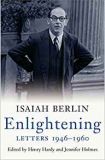Enlightening: Letters 1946 - 1960 by Isaiah Berlin
Isaiah Berlin wrote in tribute to the memory of Dorothy de Rothschild of her personality, …overwhelming charm, great dignity, a very lively sense of humour, pleasure in the oddities of life, an unconquerable vitality and a kind of eternal youth and an eager responsiveness to all that passed… Reading this second volume of letters, now available in paperback, covering Berlin's most creative period, these same characteristics might be aptly applied to Sir Isaiah himself. However, as this most self-aware of intellectuals recognised, his loquacity and compulsive socialising were driven by a persistent need to escape a sense of unreality, an inner void. In these letters he writes, my quest for gaiety is a perpetual defence against the extreme sense of the abyss by which I have been affected ever since I can remember myself…
| Enlightening: Letters 1946 - 1960 by Isaiah Berlin | |
|
| |
| Category: Autobiography | |
| Reviewer: George Care | |
| Summary: A fascinating and often amusing insight into the controversial correspondence, now available in paperback, of this famous historian of ideas. | |
| Buy? Yes | Borrow? Yes |
| Pages: 880 | Date: April 2011 |
| Publisher: Pimlico | |
| ISBN: 978-1844138340 | |
|
| |
He is at his clearest when actually writing rather than using the Dictaphone. His use of this device adds interest to the resulting text, transcribed by a sometimes confused stenographer. Here he is writing from Harvard to another editor of letters, in what he elsewhere termed his wretched Colefax-like hand,…my blindness to Mrs W's true character makes you think of me as gazing through a telescope at remote, dimly distinguishable, dwarves round whom I construct mythologies which sometimes fit & sometimes don't but always smother the subjects: I do that a little: I like rounded vignettes: & I cling to my hypotheses: it is the only sense I attach to understanding about people as opposed to moment-to-moment reactions to, or impressions of them
Berlin's tendency to construct an overarching, grand scale view of people is interesting, indeed notable. When it comes to political philosophy it is the construction of universal systems, Marxism and Monism, theories he later studied and to coin the term, the counter-enlightenment, which overarching theories Berlin most deplores. The hesitancy and multiple qualifications in his communication, often results in a diffuse and difficult prose style. However, the thick impasto and layering of shades of meaning can also reflect, like some sort of rich expressionist painting, the intention of conveying a lasting and deep impression. If you can tolerate very lengthy sentences, laced with subordinate clauses, which are richly punctuated with colons and semi-colons; then memorable and multifaceted observations on the people, politics and those interesting times, emerge.
These were indeed both interesting and difficult times.The move from diplomatic service in the States to the daily grind of teaching and lecturing in post-war Oxford, Berlin found particularly irksome. Advising Chaim Weizmann and defending the newly found state of Israel in the period after the King David Hotel attack was a duty on which he focussed his considerable abilities and influence. Later he was to meet and to like Ben Gurion. However, as his interest turned once again to Herzen and Russian intellectual history, he was careful not to get side tracked. He was involved in Paris with the setting up the Marshall plan and frankly admitted his limitations when it came to discussions on economic practicalities. Yet he began to translate his beloved Turgenev and still found opportunities to advise government propagandists on what he saw as the dangers of mentioning Hegel and the imperative of countering Russian territorial ambitions. In addition to this involvement with high level politics he was pleased to be consulted by Churchill on his memoirs. When it came to making predictions, he agreed with his fellow don, Trevor-Roper on the accuracy of those proposed by that interesting Swiss cultural historian Joseph Burkhardt based on his study of the Italian renaissance.
At Oxford his coterie included brilliant talkers that included his mentor, Maurice Bowra, the witty Warden of Wadham; here described as having felt jaded in Greece, found Athens heavenly, full of jolly poets, and himself adored there. Sir Isaiah found a warm spot for that loveable scamp Bob Boothby, talking over appeasement with which he recalled All Souls to be more than a little complicit. Then there was the scintillating company at lunch of the novelist Elisabeth Bowen. He entertains with the witty and erudite Lord David Cecil at New College, the renowned conversationalist and author of the brilliant biography of Lord Melbourne. We have only just begun the alphabet of Berlin's extensive and amusing friends which extended far beyond the University to journalists, politicians, policy wonks (as they are termed in a less deferential age ), diplomats and heads of state. One of the pleasures of reading these letters lies in this investigation of this, the social hinterland of this philosopher of secular pluralism.
A supplementary reason for reading these letters is the insight they afford into Berlin's relationship with women and other changing social attitudes. In 1956, he married Aline Halban, an exile from Russia, at the relatively late age of 46. There are indications of a developing maturity but there are also lapses into donnish backbiting, for instance A.L.Rowse is repeatedly characterised as a Malvolio in the fractious atmosphere of All Souls. This kind of gossiping is ultimately a sign of inanition and unworthy of an esteemed philosopher. However, it was a feature of the academic ambience at the time and Leslie, as Rowse is known amongst his Cornish friends, would probably have relished Berlin's further remarks about his open emotionalism, Curious. In a way better than the stiff English upper lip, & stoicism, hypocrisy and inner rages..
Reading Enlightening is no substitute for the study of Berlin's works if you are interested in his approach to the history of ideas. On the other hand, given the range of his achievements, from founding Wolfson College to his friendship with Pasternak(he smuggled out Dr Zhivago to the West) and also with the great poet Anna Akhmatova, these letters shine an interesting light on the author's effervescent persona. In this splendid tome, his peculiar sort of Englishness, his fondness for vigorous debate and his concern to counter and defeat the monster of totalitarianism are sparklingly displayed.
I'd like to thank the publishers, Pimlico Press for sending a copy to The Bookbag.
Further reading suggestions:
A View from the Foothills by Chris Mullin
The Crooked Timber Of Humanity by Isaiah Berlin
And
Please share on: ![]() Facebook,
Facebook, ![]() Twitter and
Twitter and
![]() Instagram
Instagram
![]() You can read more book reviews or buy Enlightening: Letters 1946 - 1960 by Isaiah Berlin at Amazon.co.uk Amazon currently charges £2.99 for standard delivery for orders under £20, over which delivery is free.
You can read more book reviews or buy Enlightening: Letters 1946 - 1960 by Isaiah Berlin at Amazon.co.uk Amazon currently charges £2.99 for standard delivery for orders under £20, over which delivery is free.
![]() You can read more book reviews or buy Enlightening: Letters 1946 - 1960 by Isaiah Berlin at Amazon.com.
You can read more book reviews or buy Enlightening: Letters 1946 - 1960 by Isaiah Berlin at Amazon.com.
Comments
Like to comment on this review?
Just send us an email and we'll put the best up on the site.

